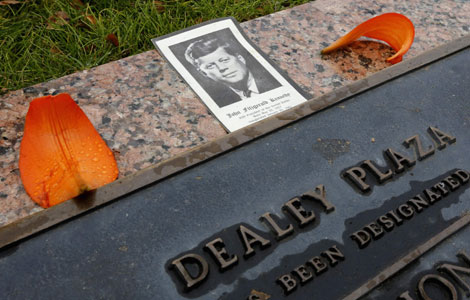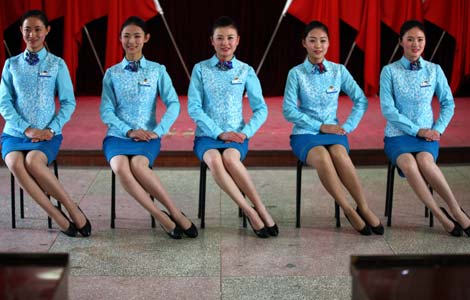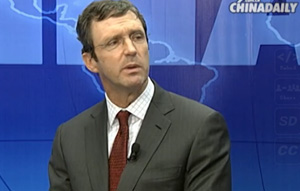Vice-Premier makes the rounds
Updated: 2013-11-22 13:44
By Chen Weihua in Washington (China Daily USA)
|
||||||||
|
Chinese Vice-Premier Liu Yandong delivers a speech at the School of International Service at American University in Washington on Thursday while US Secretary of State John Kerry listens. Sun Chenbei / China Daily |
|
Chinese Vice-Premier Liu Yandong shakes hands with former US Secretary of State Hillary Clinton after they addressed a forum on China-US collaboration in early child development held at the Brookings Institution in Washington on Wednesday. |
While Chinese students have become the largest group of international students in universities and colleges in the United States, visiting Chinese Vice-Premier Liu Yandong tried to push for more Americans going to study in China.
On Thursday afternoon, she addressed the first annual meeting of the 100,000 Strong Foundation, a non-profit organization that aims to promote the 100,000 Strong Initiative first announced by US President Barack Obama in a town hall meeting in Shanghai in November 2009. The initiative aims to send 100,000 American students to study in China over a period of four years.
Liu touted the initiative as "a remarkable fruit on the big tree of China-US people-to-people exchanges".
In the past more than three years, there have been some 68,000 Americans going to study in China.
"The establishment of the 100,000 Strong Foundation has provided not only a new path but also a fresh drive for implementing the initiative and deepening people-to-people exchanges," Liu told an audience of some 200 people in the School of International Service at American University in Washington.
Audiences included some passionate patrons such as Stephen Schwarzman, chairman and CEO of the Blackstone Group, who announced in April an effort to raise $300 million to start a program at Tsinghua University in Beijing, and Florence Fang, founder of the Florence Fang Family Foundation and a founding supporter for the 100,000 Strong Foundation.
"Today on China's college campuses, we can meet more and more young Americans studying under the initiative and their progress often amazes us immediately," Liu said.
"Together with their Chinese counterparts, they form a fresh force dedicated to closer friendship between the two peoples," Liu said, adding that she has seen in them an unlimited vigor of youth and an infinite charm in our ongoing people-to-people exchanges.
Liu, who was visiting the US for the fourth China-US High-Level Consultation on People-to-People Exchange, which concluded Thursday afternoon, said the Chinese government encourages young people to study abroad. A report by the Institute of International Education (IIE) released last week showed that Chinese students numbered 235,000 in US universities and colleges in 2012-13, accounting for roughly 30 percent of all international students in the US.
"We also encourage young Americans to study in China," Liu said.
China was the fifth most-popular destination for US students studying abroad in the 2011-12 academic year, trailing Britain, Italy, Spain and France. Overall, about 15,000 US students were studying in China for degree and for-credit programs. And this did not include another approximately 10,000 American students going to China each year for short-term, no-credit language and volunteer programs, according to the IIE 2013 Open Doors report.
Liu said she noticed that the slogan for the annual conference is "Investing in US-China Relations, One Student at a Time". "Indeed, investing in youth is to invest in the future," she said.
US Secretary of State John Kerry was expected to join Liu in addressing the conference, but he could not make it due to an emergent meeting at the White House.
However, Danny Russel, US assistant secretary for East Asian and Pacific affairs, recalled in a panel discussion how his three-year study abroad in Japan had changed his understanding of other countries and his own country.
"The key takeaway for me is we have to, particularly as Americans, we have to understand, we have to learn how the world works, not by watching on TV, not by looking through binoculars, but getting out, doing things, meeting people and studying abroad," said Russel, a career diplomat who spent a long time in Asia.
"My experience as a diplomat is that a lot of time, we are arguing things we actually agreed on and we just don't know it."
He also believes that study abroad allows students to understand their own country and culture better when they get some distance from their own country.
Stephen Schwarzman, the Wall Street mogul, hoped that the scholarship he set up at Tsinghua could help people get the kind of overseas experience he did not get in his youth, saying that he was rejected by the Rhodes Scholarships many years ago.
On Oct 24, a residential and teaching building for the Schwarzman program broke ground in Beijing. When operational in 2016, the program will bring 200 students a year to China - 45 percent from the US, 20 percent from China and 35 percent from the rest of the world.
"The potential of the scholarship to be effective is quite good," he told China Daily.
Schwarzman believed that people from the scholarship program will be able to interpret China better back in their own countries. "That's one very important way to defuse tension," he said.
(China Daily USA 11/22/2013 page10)

 Oil pipeline blast leaves 22 dead in E China
Oil pipeline blast leaves 22 dead in E China
 Good couples get better
Good couples get better
 More than 9m Syrians need humanitarian aid
More than 9m Syrians need humanitarian aid
 50th anniversary of the assassination of Kennedy
50th anniversary of the assassination of Kennedy Blueprint tightens EU links
Blueprint tightens EU links
 Beckham promotes bodywear in Shanghai
Beckham promotes bodywear in Shanghai
 Service seminar for E China train attendants
Service seminar for E China train attendants
 Kennedy cousin Skakel poised for prison release
Kennedy cousin Skakel poised for prison release
Most Viewed
Editor's Picks

|

|

|

|

|

|
Today's Top News
Wang named Asia's businessman of the year
Bitcoin rollercoaster hits China
US President sets new date for Asia visit
Bid to boost people ties
Manufacturing PMI seen moderating in Nov
Kennedy cousin Skakel poised for prison release
'Tapering' of QE would benefit world
Blueprint tightens EU links
US Weekly

|

|








